Top 5 Ecommerce Marketing Automation Tools in 2025
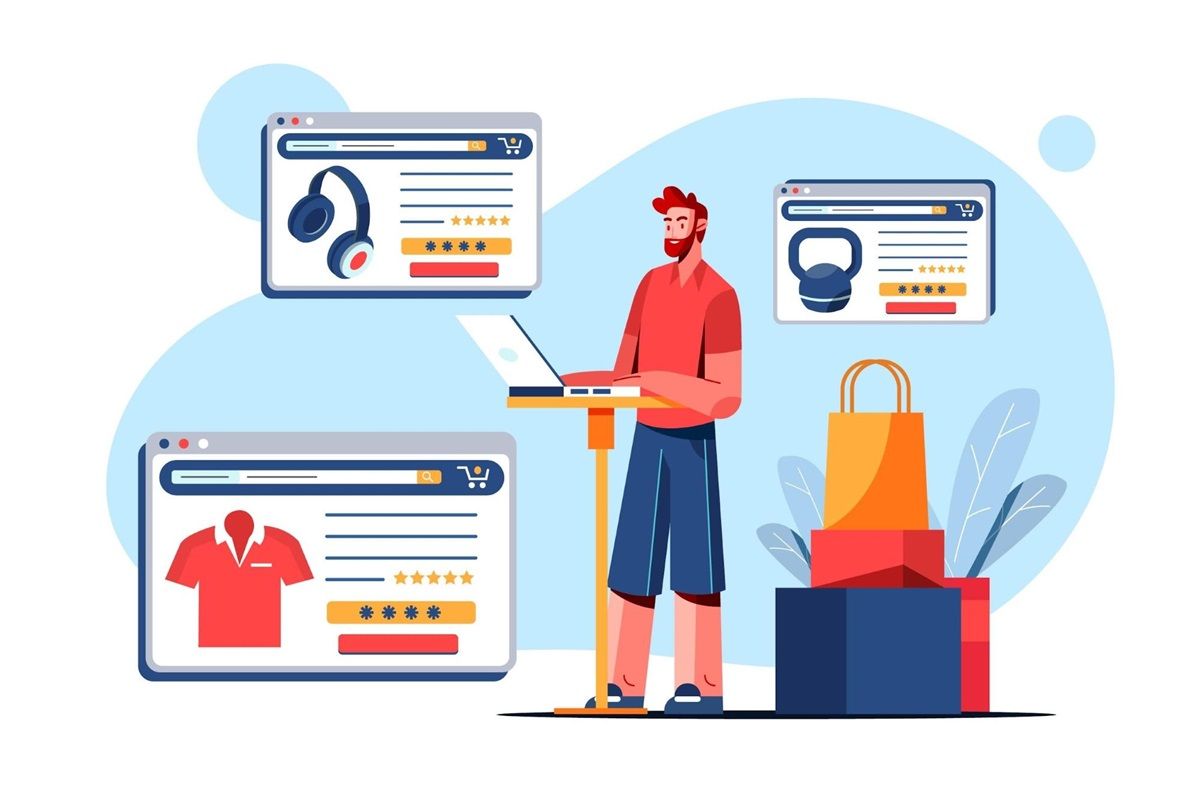
For ecommerce business owners, daily marketing work can feel nonstop. You need to send emails, post on social media, and chase abandoned online shopping carts while trying to grow sales.
Doing everything manually wastes time and slows results. That’s why more stores turn to ecommerce marketing automation.
With the right automation tools, you can build automated workflows that cut repetitive tasks, improve customer experience, and help you sell more with less effort.
In this guide, you will learn what ecommerce marketing automation is and the platforms you should try in 2025.
What Is Ecommerce Marketing Automation?
Ecommerce marketing automation uses automation software to handle repetitive marketing tasks like sending emails, posting on social media, and segmenting customers.
For an ecommerce store, this means less manual work, smoother processes, and a stronger customer experience.
The system works through simple steps: a potential customer signs up, views a product, or adds items to their cart. Afterwards, the software checks details such as purchase history.
When the conditions match, it responds with the right action. That might be an email, an SMS, or an update across a range of digital marketing channels.
Store owners often say, “Yeah, that’s exactly what I need,” and they’re right. Automation covers moments you deal with every day:
- A welcome flow that greets new sign-ups.
- Cart reminders that recover lost orders.
- Personalized product suggestions that increase order value.
- Post-purchase emails that confirm orders and request reviews.
- Win-back offers that re-engage quiet buyers.
- A chatbot on landing pages that answers questions instantly.
Benefits of Ecommerce Automation
A successful online store relies on more than great products. Growth happens when you focus on what matters. Ecommerce automation makes that possible.
On the operations side, automation removes the strain of manual jobs:
- It handles repetitive tasks like order confirmations, shipping updates, and inventory checks.
- Real-time tracking helps you reorder stock before items run out.
- Data from purchase history flows into your customer relationship management system so your team has accurate profiles to work with.
For your buyers, automation delivers messages on time and across the right channels. It keeps shoppers engaged, strengthens customer loyalty, and makes every interaction more relevant.
Besides that, it builds trust because automation makes it easier to collect more customer feedback after a sale.
From a growth perspective, automation supports strategies like automated customer segmentation. You can run smarter email marketing and ad flows, measure results, and refine your automation strategy without losing focus on sales.
That’s the real payoff: higher ROI, happier teams, and customers who keep coming back.
Types of Ecommerce Marketing Automation
A busy store cannot run on manual work alone. These are the common types of automated marketing campaigns:
SMS and Email Marketing Automation
With email and sms marketing automation, you cover every stage of the customer journey and connect with both new customers and repeat buyers.
Some of the most common flows include:
- Browse and cart reminders that bring shoppers back.
- Transactional updates confirming orders and shipping.
- Recommendations and replenishment reminders based on purchase history.
- Review requests to gather more customer feedback.
These are grouped into automated email campaigns or paired with sms campaigns for even better results.
Website Personalization

A one-size-fits-all website rarely converts. Website personalization adapts your store to match the needs of different website visitors by using data such as purchase history.
Ways to personalize include:
- Dynamic homepages for first-time visitors versus returning buyers.
- Targeted pop-ups with discounts for new customers.
- Personalized search results that speed up product discovery.
- Check out reminders with upsells or free shipping thresholds.
Behind the scenes, strategies like automated customer segmentation decide who sees what. When done consistently, personalization keeps customer engagement high, builds long-term customer loyalty, and feeds into emails, sms marketing, and ads for a unified program.
The result is a site that feels designed for each shopper and drives better conversions for your brand.
Quality Benchmark Alerts
Catching problems early can save sales. Quality benchmark alerts monitor performance and warn you when numbers fall outside your targets.
Examples of alerts include:
- Conversion rates dropping below a set percentage.
- Cart abandonment rising faster than expected.
- Page load times slowing beyond your standard.
- Negative customer feedback appearing suddenly.
These alerts often connect with customer relationship management tools, so your team can follow up fast. Adding them to your automation strategy keeps your store steady and your data accurate.
For shoppers, this means fewer checkout errors, smoother browsing, and reliable transactions every time. For you, it means peace of mind. The system checks performance nonstop while you focus on growth.
Social Media Scheduling and UGC Curation
Your social media marketing strategy depends on regular posting and authentic content. Scheduling tools and UGC curation make this simple.
With scheduling tools, you can:
- Bulk upload posts.
- Choose optimal posting times.
- Recycle evergreen content.
- Keep feeds active across social media platforms.
UGC tools let you collect real customer photos and videos, manage rights automatically, and turn content into shoppable galleries or ads.
For marketing teams, this approach means less daily work and more authentic outreach. Buyers see both planned posts and genuine customer voices. Over time, this combination builds trust, strengthens customer engagement, and supports steady sales growth.
5 Ecommerce Marketing Automation Software in 2025
The right ecommerce marketing automation platform helps you sell more with less effort. In 2025, several tools stand out for email, SMS, and AI-driven workflows. Here are the top options to consider.
1. Activepieces
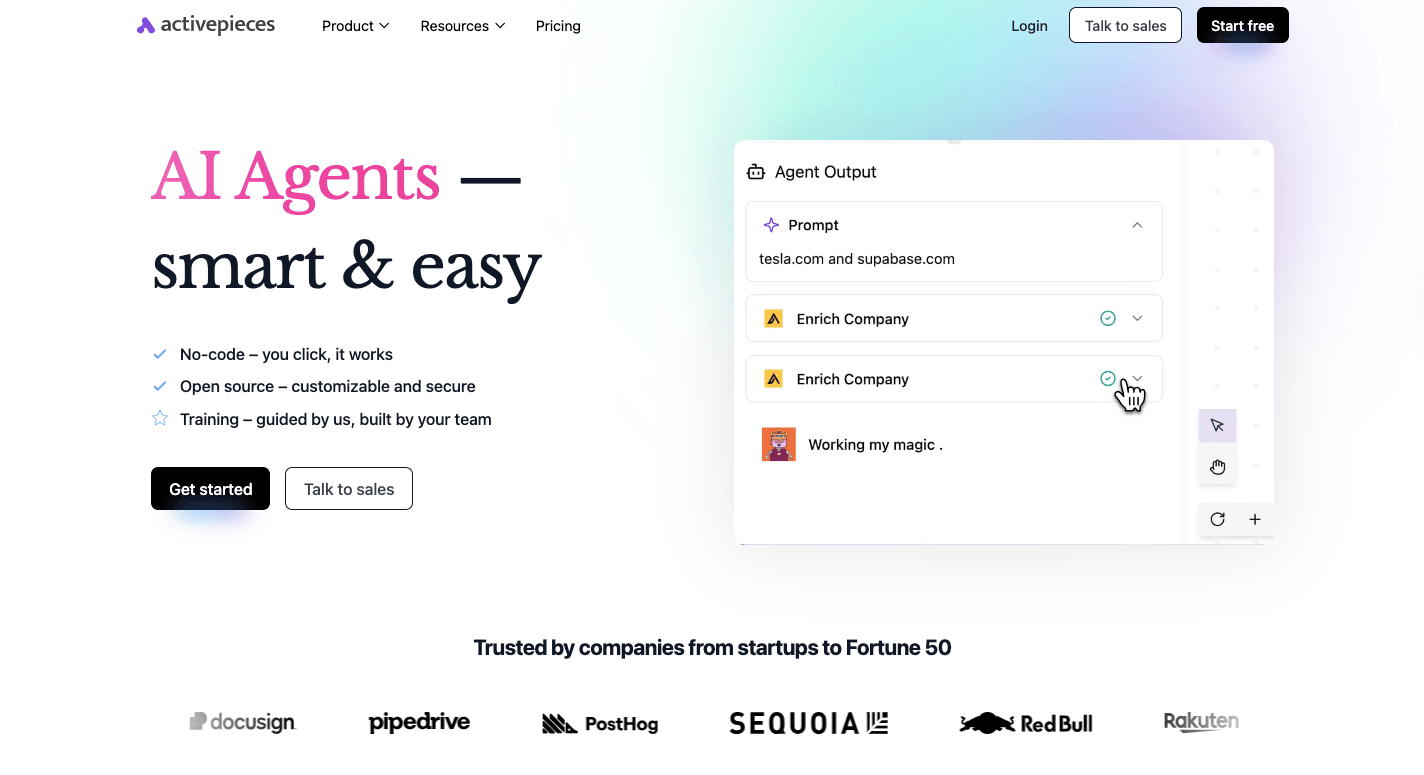
You set up abandoned cart reminders, but they don’t sync right. Customer data sits in silos between your CRM platform and store. Reports take forever to build. By the time you fix one thing, another fire pops up.
That’s where Activepieces, an AI workflow automation tool, comes in. It lets you create automated workflows that connect all your apps, cut down repetitive work, and give you space to run smarter marketing efforts.
Even for small ecommerce businesses, the impact is immediate. You can do more with the same team, without burning them out or hiring extra staff. Larger brands get enterprise-level security, AI-ready tools, and complete control over how workflows run.
Key Features
- Workflow builder – Automate emails, SMS, or app updates without coding.
- Segmentation – Reach shoppers based on their purchase history.
- CRM sync – Keep your CRM updated automatically.
- AI steps – Add AI into workflows for smarter product suggestions or responses.
- Human approval – Add sign-off steps when workflows need oversight.
- Reports – Track results and make improvements quickly.
Integrations
Every store already runs on dozens of apps. Activepieces makes them work together. With more than 379 integrations and a community that keeps building more, your stack won’t hold you back.
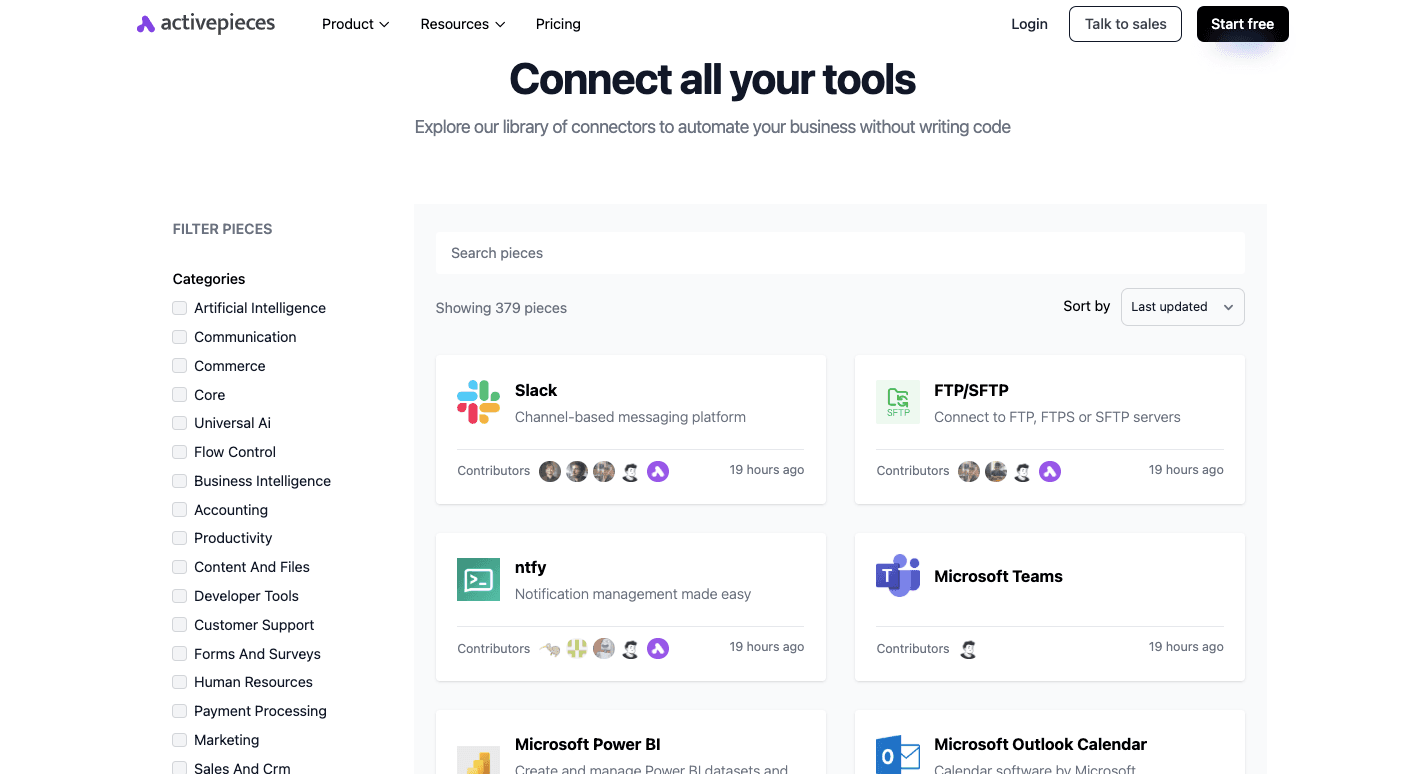
- Connect to your ecommerce platform like Shopify or WooCommerce.
- Sync data with CRM tools such as HubSpot or Zoho.
- Pair with marketing apps, including WordPress and ActiveCampaign.
- Use productivity tools like Slack, Google Sheets, and ClickUp.
- Add AI services such as OpenAI and Google Gemini.
Since it’s open source, you’re not stuck waiting months for a feature. Developers and users contribute constantly, which means integrations keep expanding. Unlike other platforms that push advanced connections into higher tiers, Activepieces gives you more options from day one.
Use Cases
- Send welcome emails the second someone signs up.
- Recover carts with emails and SMS that reach buyers quickly.
- Push leads into your CRM platform automatically.
- Route customer support tickets to Slack so no request slips through.
- Sync lists, ads, and sheets without lifting a finger.
- Trigger upsells after a purchase to boost customer loyalty.
Pricing
Activepieces keeps costs predictable. Unlike tools that nickel-and-dime you per task, it offers flat-rate plans you can trust as you grow.
- Free – 1,000 tasks, AI steps, 200 AI credits, two flows.
- Plus ($25 per month) – Unlimited tasks (fair use), ten flows, 500 AI credits.
- Business ($150 per month) – Unlimited tasks, 50 flows, 1,000 AI credits, ten projects, five users.
- Enterprise (Custom) – Custom resources and dedicated support.
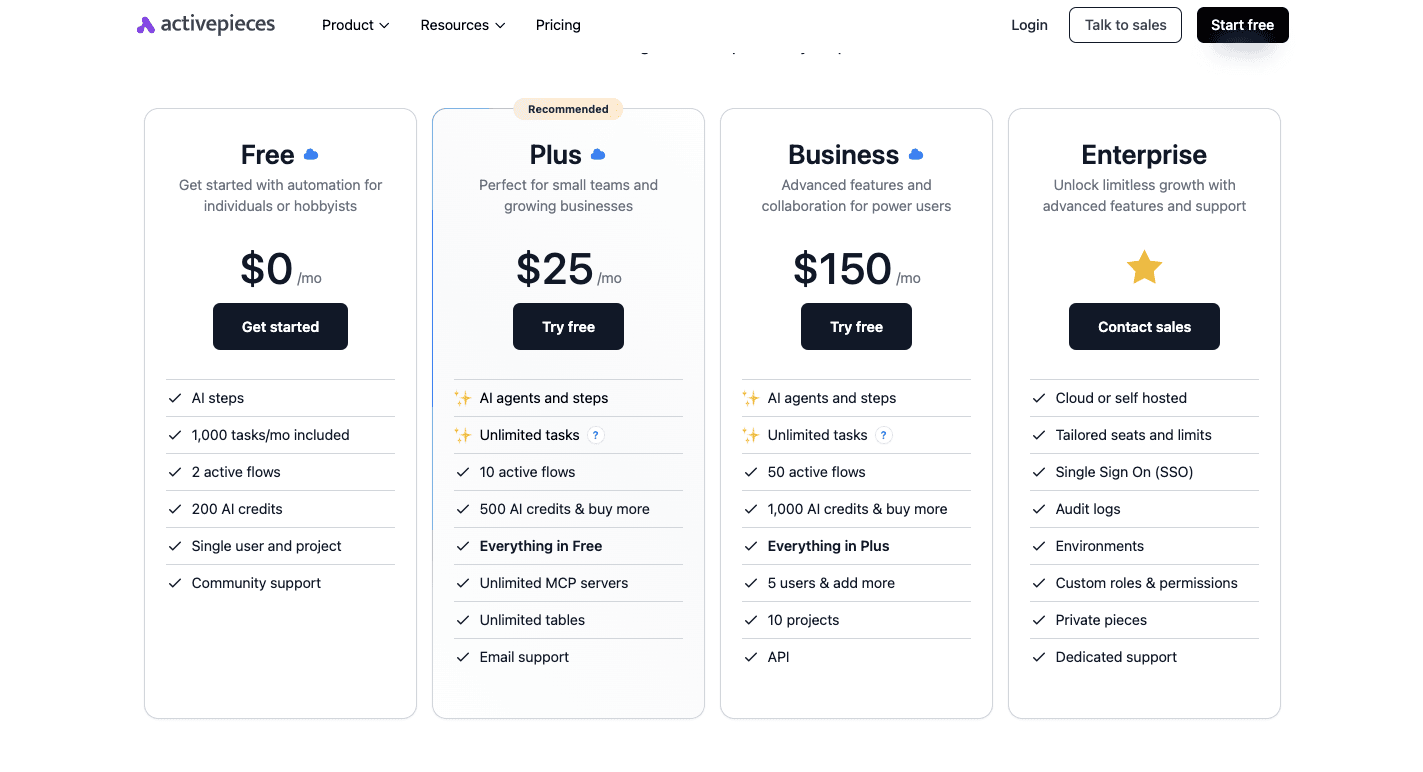
There’s also a Community Edition that’s free and self-hosted. Compared to Zapier or Make, Activepieces avoids the “per task” pricing trap and delivers more value for high-volume users. That predictability is what lets growing stores scale with confidence.
Try Activepieces and grow your ecommerce business without the busywork!
2. Dotdigital
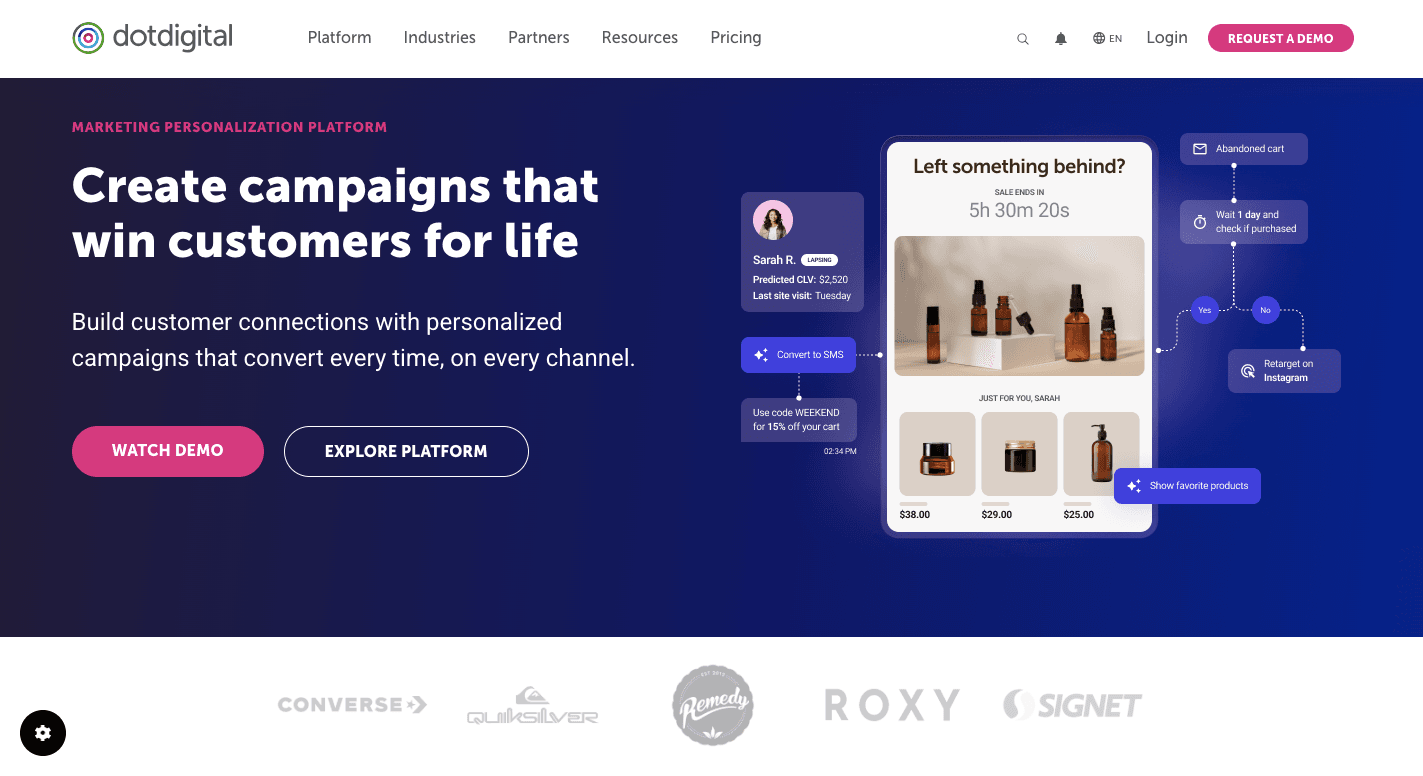
Dotdigital is an ecommerce marketing automation platform for store owners who use email, SMS, and chat software at once. It also offers customer data solutions so you can finally see everything in a single view.
The platform focuses on keeping customers around for the long run. If you have ever thought, “I wish I could get more repeat purchases without sending every single message myself,” Dotdigital does that.
From welcome emails to re-engagement campaigns, it helps you stay in touch at every step. Many brands in Europe and Asia already use it, and more stores worldwide are starting to use it.
Key Features
- Advanced segmentation – Sort customers by purchase history, behavior, and demographics for smarter targeting.
- Hyper-personalization – Use AI to send product suggestions and special discounts that feel personal.
- Multi-channel automation – Run email, SMS, push, chat, and WhatsApp from one place.
- Website personalization – Adjust your site for different website visitors.
- Ecommerce integrations – Connect easily with Shopify, BigCommerce, and Adobe Commerce.
- Attribution insights – Track revenue and know which campaigns really worked.
- Visual journey builder – Use drag-and-drop features that help marketing teams set up workflows.
Pros
- Easy integrations with Shopify, Magento, and BigCommerce.
- Omnichannel campaigns that keep email, SMS, and chat connected.
- A quick support team that helps when you get stuck.
Cons
- Learning curve is steep for advanced features.
- Template designs feel limited at times.
- Reports don’t always go deep enough for finance teams.
Pricing
Dotdigital doesn’t disclose its pricing publicly.
3. Rejoiner
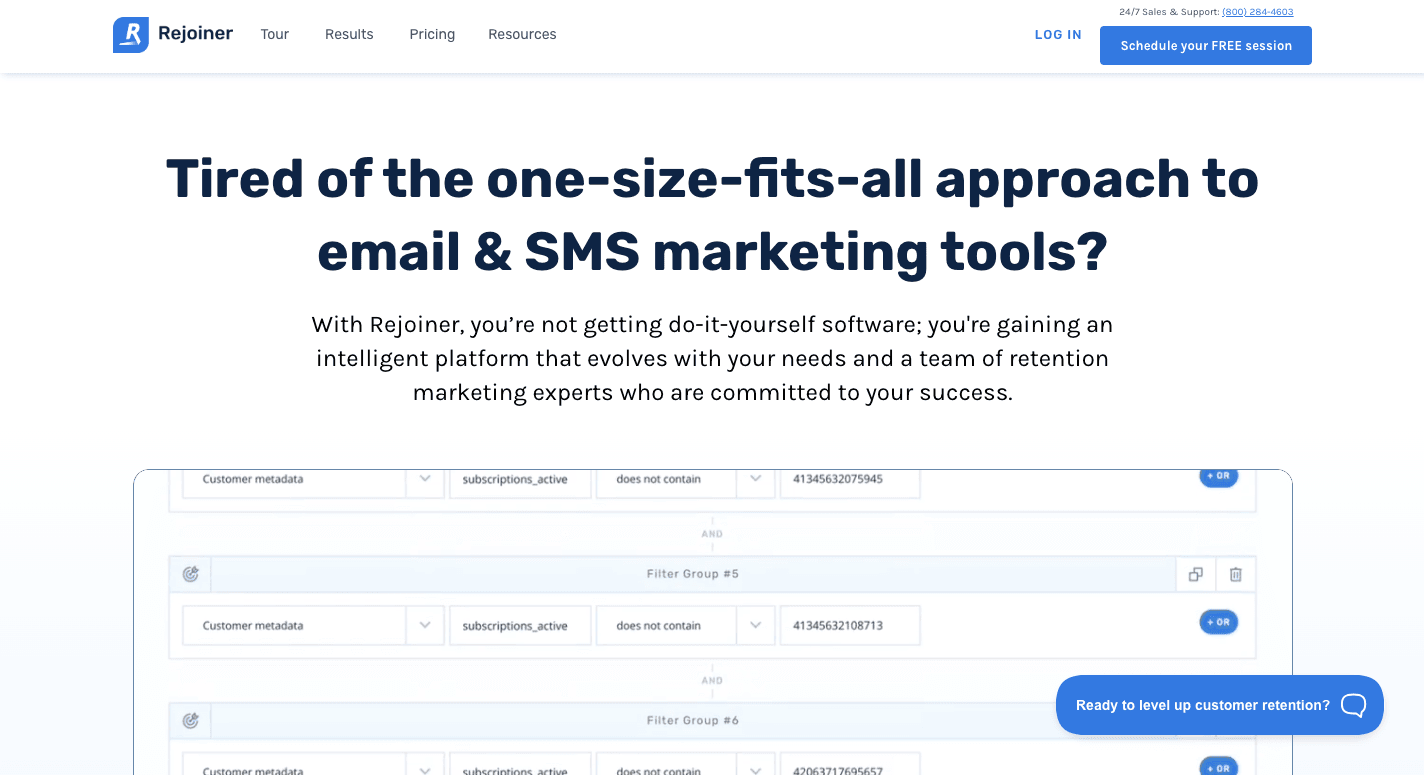
Losing sales to abandoned carts stings. You watch traffic come in, items go into carts, and then nothing.
For stores processing a high number of customer purchases, that loss adds up fast. Rejoiner, an ecommerce email marketing platform, solves that by providing a team of experts to manage campaigns for you.
Unlike self-service platforms, Rejoiner merges software with managed services. That means the tech runs in the background while a professional team designs, writes, and optimizes your campaigns.
Other than that, it integrates with major ecommerce platforms and marketing tools, so your data stays in sync and your campaigns hit the right people at the right time.
Key Features
- Abandoned cart recovery – Send reminders that bring shoppers back to complete orders.
- Automated email and SMS journeys – Run welcome flows, post-purchase campaigns, and re-engagement series.
- Customer segmentation – Group buyers by spend, behavior, and engagement.
- Personalized recommendations – Suggest products based on browsing and purchase history.
- Reporting and analytics – Track conversions and revenue in real time.
- Cross-device cart regeneration – Restore shopping carts across multiple devices.
- Managed services – Access design, writing, and strategy from Rejoiner’s in-house experts.
Pros
- Full-service help for design, writing, and strategy.
- Quick integrations that get campaigns running fast.
- Ongoing testing and monitoring to improve results.
Cons
- Less control if you prefer to run every detail yourself.
- Reporting isn’t as deep as advanced analytics platforms.
- Email focus means limited support for full omnichannel campaigns.
Pricing
Rejoiner charges depending on active contacts. Plans begin around $25 per month for up to 1,000 profiles, with unlimited emails included.
The Strategy Partner plan starts at $1,500 per month and adds expert-led design, writing, and campaign management. A free trial is available, which gives businesses a chance to test the platform before committing.
4. Klaviyo
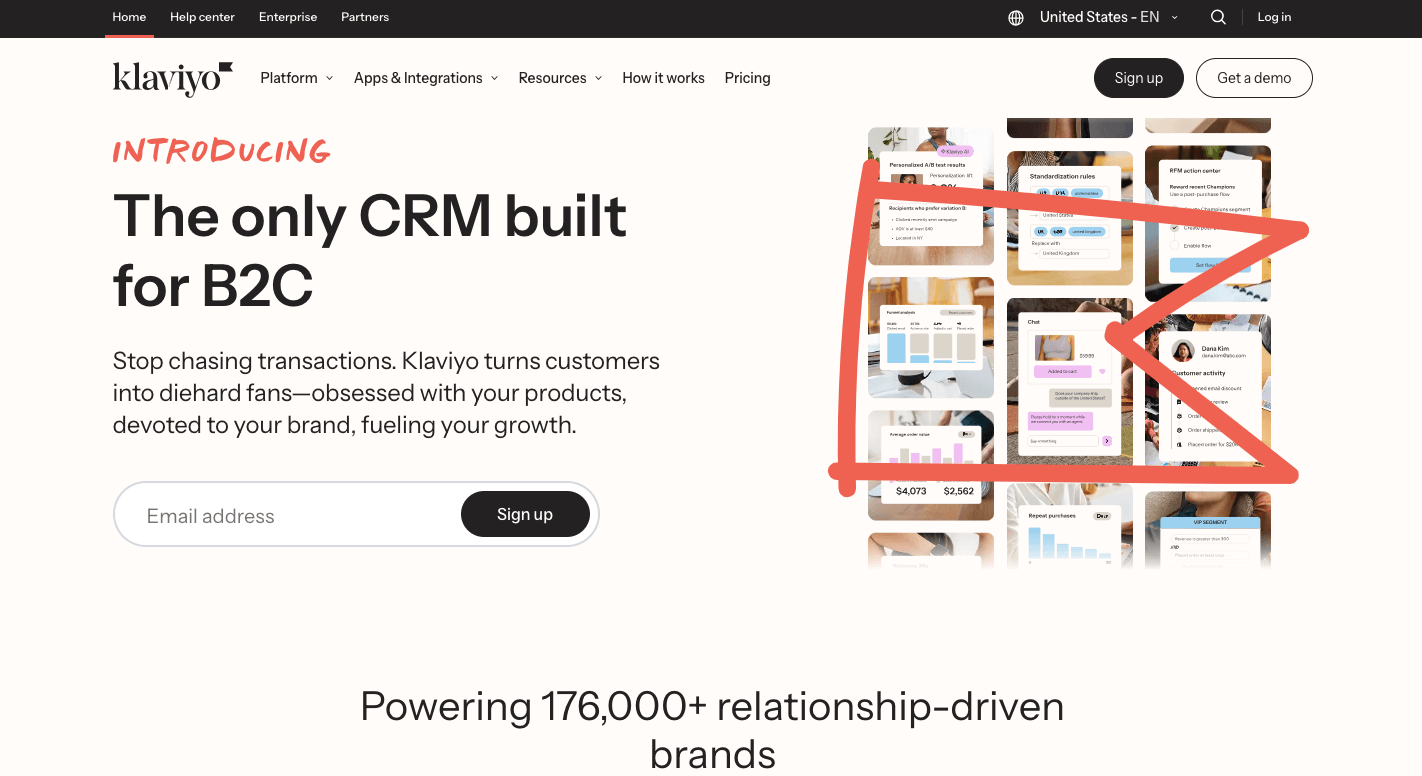
Klaviyo connects your store data with marketing tools so you can send the right message at the right time.
Businesses under direct-to-consumer use it because it offers a range of automated marketing tools: personalized email, SMS, and pushover notifications that fit neatly into the customer lifecycle.
It pulls in real-time store data, so campaigns match actual shopper behavior. The result is communication that feels personal, not generic.
Besides that, Klaviyo supports acquisition, conversion, and retention in one place. You can grow lists, recover carts, and encourage repeat sales with built-in flows.
Add in detailed analytics and predictive features, and you have a system that runs campaigns and improves them over time.
Key Features
- Customer data platform – Centralizes browsing history, purchase history, and engagement into one profile.
- Hyper segmentation – Build detailed segments based on spend, products viewed, or engagement level.
- Automated flows – Pre-built and custom workflows for welcome series, abandoned carts, and post-purchase follow-ups.
- Personalized product feeds – Dynamically suggest items to increase average order value.
- Reporting and analytics – Track revenue per recipient, CLV, and other performance data.
- AI features – Predict churn risk, send at optimal times, and generate subject lines.
- Optimization – Use A/B testing to improve subject lines, send times, and content.
Pros
- Deep integrations with Shopify, WooCommerce, and BigCommerce.
- Flow builder makes automation easier to set up and customize.
- Detailed analytics beyond open and click rates.
Cons
- Costs rise quickly as your list grows.
- No native landing pages, so you may need third-party tools.
- Email focus makes it less suited for B2B or non-ecommerce.
Pricing
Klaviyo offers tiered pricing. A free plan includes up to 250 profiles, 500 monthly emails, and 150 SMS/MMS credits, though support only lasts for 60 days.
Meanwhile, the Email plan starts at $45 per month for 15,000 sends and full integrations. The Email + SMS plan starts at $60 per month, adding 1,250 SMS/MMS credits and multi-channel segmentation.
5. Omnisend
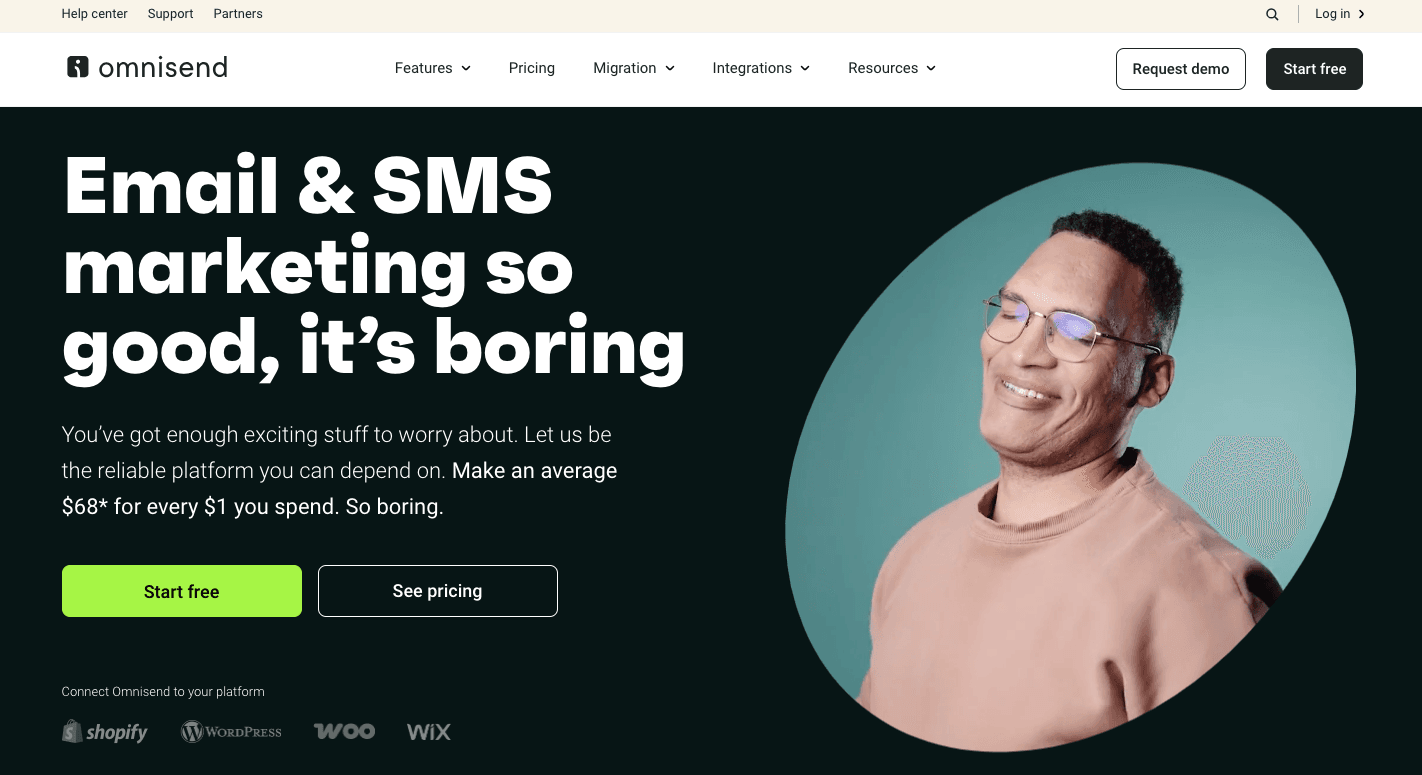
You can connect Omnisend to your ecommerce platform like Shopify or WooCommerce in just a few clicks. Once connected, you’ll see how easy it is to build flows that actually match customer behavior.
Someone abandons a cart? They’ll get an email first, then a text if they don’t open it, and finally a push notification the next day. That kind of layered communication keeps your brand top of mind without extra work on your side.
With templates, a drag-and-drop builder, and pre-built workflows, you can be running abandoned cart campaigns or post-purchase flows in no time. For many stores, Omnisend is the tool that makes omnichannel automation feel doable.
Key Features
- **Dynamic forms – Pop-ups, teasers, and gamified sign-up tools like spin-to-win.
- Omnichannel campaigns – Combine email, SMS, and web push notifications in a single flow.
- Customer lifecycle map – Groups shoppers by lifecycle stage so you can target loyalists or at-risk customers differently.
- Segmentation – Build targeted groups based on shopping history, engagement, or spend.
- Sales reporting – Real-time dashboards that tie revenue directly to campaigns.
- Integrations – Connect to major ecommerce platforms like Shopify, WooCommerce, and BigCommerce.
Pros
- Affordable plans make it accessible for small to mid-sized stores.
- Omnichannel support with email, SMS, and push notifications in one flow.
- 24/7 support that many users find responsive and helpful.
Cons
- Analytics are more basic compared to higher-end tools.
- A/B testing options are limited to subject lines and sender names.
- Landing pages are basic and may require third-party tools.
Pricing
Omnisend offers a free plan. The Standard plan starts at $16 per month for 500 contacts, with unlimited web push notifications.
On the other hand, the Pro plan starts at $59 per month for 2,500 contacts and adds advanced reporting, personalized recommendations, and priority support. All plans include 24/7 live chat and email support.
Dominate Ecommerce Marketing Automation With Activepieces
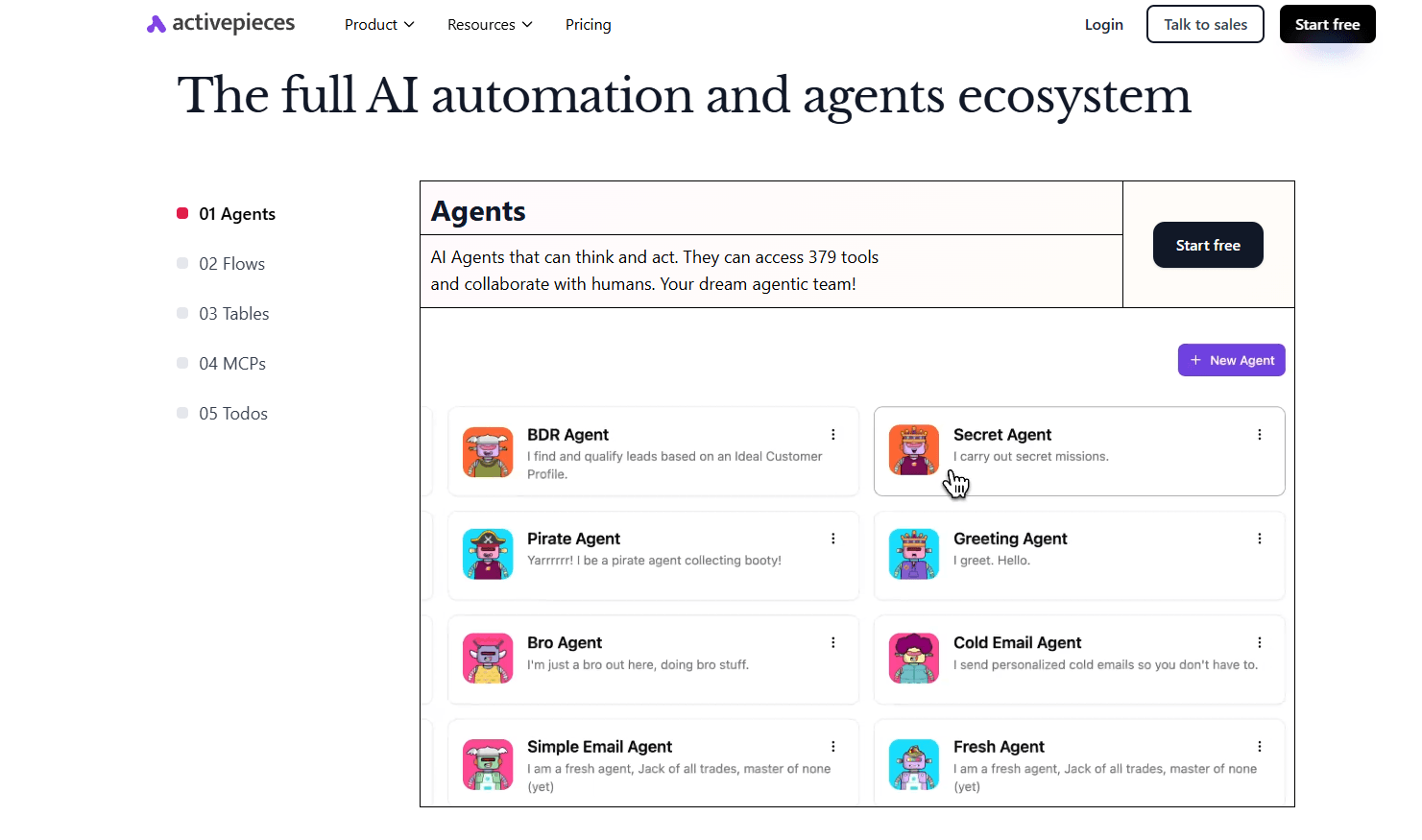
Growth in ecommerce doesn’t come from working longer hours. It comes from building systems that handle your busy work.
Activepieces makes that possible. It’s an open-source AI workflow automation that connects your apps, manages campaigns, and runs tasks so your team can focus on sales.
Marketers like the simple no-code builder. Meanwhile, developers like the full customization in TypeScript. You get freedom to design automations that fit your store and your marketing goals.
Activepieces also has agents, AI Copilot, and built-in steps that make campaigns smarter and faster. Add enterprise-grade security, self-hosting, and hundreds of integrations, and you’ve got a tool that grows with you instead of slowing you down.
Competitors charge more as you scale or hold back features. Activepieces keeps things flexible, fair, and powerful for both startups and global brands.
Connect with sales today with Activepieces and discover how easy automation can be for your team!
FAQs About Ecommerce Marketing Automation
What is ecommerce marketing automation?
Ecommerce marketing automation is the use of software to run tasks like email, SMS, ads, and customer segmentation without constant manual effort. It helps ecommerce companies send the right message at the right time, build stronger connections with loyal customers, and recover abandoned carts.
With automation workflows, stores can guide existing customers back for repeat purchases and increase online sales across multiple channels. It’s also the backbone of successful email marketing, making campaigns faster, smarter, and more personal.
What are the five C’s of ecommerce?
The five C’s are: Customers, Content, Convenience, Communication, and Conversion. Together, they explain how online businesses attract and retain buyers, deliver useful experiences, and move shoppers toward completing a purchase.
Can you automate ecommerce?
Yes. Ecommerce can be automated with tools that handle email flows, abandoned cart reminders, loyalty programs, ads, and even inventory updates. Automation saves time, reduces errors, and creates a more consistent shopping experience.
What is the best marketing automation tool?
The best marketing automation tool depends on your needs, but Activepieces stands out because it’s open source, AI-ready, secure, and affordable. It connects to hundreds of apps and makes it simple to build flows that actually help you grow.


